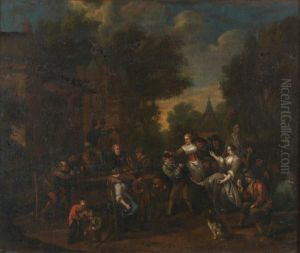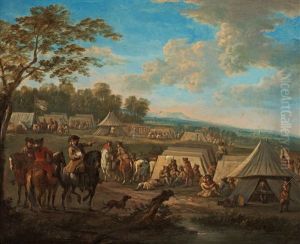Charles Breydel Paintings
Charles Breydel, also known as Karel Breydel or Le Chevalier Breydel, was a Flemish painter born in 1673 in Antwerp, Belgium. He is primarily remembered for his contributions to landscape and battle scene paintings, a genre that was highly popular in the 17th and 18th centuries. Breydel's works are characterized by their dynamic compositions, meticulous attention to detail, and the vivid portrayal of light, which brought his scenes to life and earned him a distinguished place among the artists of his time.
Despite being born into an era when the art scene was dominated by the Baroque style, Breydel managed to carve out a unique niche for himself by blending the traditional elements of Baroque with his own innovative techniques and perspectives. His early life is not well-documented, but it is known that he embarked on the customary journeyman years, which likely included travels to various parts of Europe, where he would have been exposed to a wide range of artistic styles and techniques. These experiences enriched his artistic vocabulary and influenced his later works.
Breydel's battle scenes are particularly notable for their realism and the sense of movement he was able to impart to them. He had a knack for capturing the chaos and fervor of battle, making his paintings highly sought after by patrons who desired to commemorate their victories or simply wished to own a piece of art that depicted military valor with such authenticity. Beyond the battlefield, Breydel also had a profound ability to depict serene landscapes and pastoral scenes, demonstrating his versatility as an artist.
Throughout his career, Charles Breydel enjoyed considerable success and recognition. He became a member of the Guild of St. Luke, a prestigious association for artists and craftsmen, which further solidified his standing in the artistic community. His works were collected by aristocrats and art connoisseurs across Europe, contributing to his reputation that extended well beyond his native Belgium.
Charles Breydel passed away in 1744, leaving behind a legacy that would influence future generations of landscape and battle painters. His ability to capture the essence of his subjects, whether in the heat of battle or the tranquility of a rural scene, ensured his place in the annals of art history. Today, Breydel's paintings are housed in various museums and private collections around the world, where they continue to be admired for their beauty and historical value.

